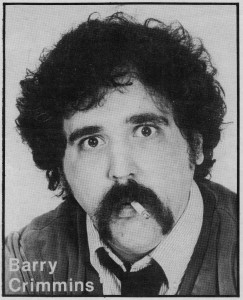When they hear the name "Bobcat Goldthwait", most people seem to draw a blank. Some may remember his inimitable stage voice -- somewhere between squeaky and growly -- particularly from his appearances in the Police Academy movies. And some remember his more recent career as a director of pitch-black comedies like Shakes the Clown, World's Greatest Dad, and God Bless America. But almost nobody is likely to know where his name comes from.
I certainly didn't, until I saw Call Me Lucky, Goldthwait's documentary about Barry Crimmins. Crimmins was a huge influence on what we know of comedy today, but without even as memorable a hook as the Police Academy movies to hang his name on he's even less likely to stick in most people's minds than Goldthwait is.
 The shame of it is he's the sort of voice we should probably hear more from. As one of the many comics Goldthwait interviews puts it, he's one of the few people who get more articulate the angrier they get, and there's certainly a lot for him to get angry at. Crimmins is a big, shaggy bear of a guy -- in the '70s and '80s a dead ringer for that era's Elliott Gould, with his curly black hair and moustache, and more recently for Fidel Castro -- and God help you if he found reason to roar at you.
The shame of it is he's the sort of voice we should probably hear more from. As one of the many comics Goldthwait interviews puts it, he's one of the few people who get more articulate the angrier they get, and there's certainly a lot for him to get angry at. Crimmins is a big, shaggy bear of a guy -- in the '70s and '80s a dead ringer for that era's Elliott Gould, with his curly black hair and moustache, and more recently for Fidel Castro -- and God help you if he found reason to roar at you.But political material and vitriolic delivery didn't sell many comedy specials. Even George Carlin comes off as genial and careful next to Crimmins' pointed willingness -- even eagerness -- to offend specific and particular people who have earned his ire. So his influence came more in his establishment of the stand-up comedy scene in Boston. His two clubs, the Ding Ho and Stitches, provided boosts to the careers of up-and-coming comedians who are now household names, like Stephen Wright, Paula Poundstone, and many others including Goldthwait himself.
Crimmins would also reach beyond comedy into activism for a cause he believed in. When Cindy Sheehan protested outside George W. Bush's ranch and continues to speak out against the same foreign policies under Barack Obama, Crimmins is there on the battlements with her, amplifying her small but steadfast voice with his own bellows.
But the real turn in the film comes when we learn where Crimmins got this finely-honed sense of justice: he was himself a victim of child sexual abuse. He's very frank and open with the details of his experience, and hearing them is sickening. It's valuable, though, in the way it pierces the veil of silence and shame that settles around victims and survivors, particularly males. And it's a turn that only a director with Goldthwait's experience handling darker material can handle as deftly and respectfully as he does.
Crimmins' comedy is strong stuff, and far from everybody's taste, shot through with anger and pain. But at least a little pain is an essential ingredient in all good comedy; Crimmins reminds us that the important thing isn't to avoid causing pain, but to know how and where to direct it. He came out of his ordeal angry and ready to fight on behalf of anyone who might need defending, but he retains a real warmth and generosity even towards people he passionately disagrees with. We would all be lucky to be a little more like Barry Crimmins, the Bear Cat.
Rating: 4 out of 5














